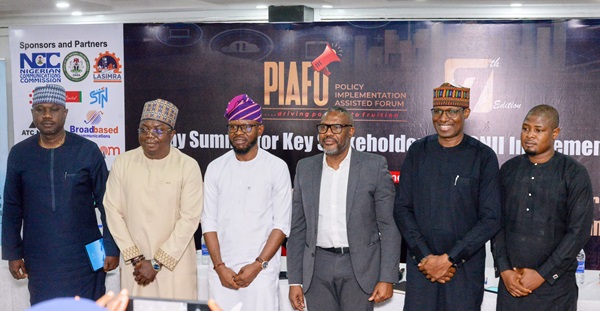
Industry leaders have outlined key measures to protect telecommunications infrastructure in Nigeria, emphasising that securing investments in the sector requires more than just implementing the Executive Order on the Designation and Protection of Critical National Information Infrastructure (CNII).
While acknowledging the importance of the CNII Order, they argued that infrastructure safety cannot be guaranteed unless operators first address internal challenges and standardisation issues.
Speaking at the 7th Policy Implementation Assisted Forum (PIAFo) Summit on CNII implementation held Thursday in Lagos, industry stakeholders highlighted pressing concerns such as infrastructure vandalism, unauthorised installations, and cable theft. They proposed actionable solutions to safeguard the country’s critical telecommunications assets.
Chairman of the Association of Licensed Telecommunications Operators of Nigeria (ALTON), Gbenga Adebayo underscored the need for proper infrastructure maintenance and installation to prevent theft and vandalism. He pointed out that the widespread theft of manhole covers and poles results from poor maintenance practices.
“When properly installed, these components are difficult to remove. However, negligence often leaves them unsecured, making them easy targets for thieves,” he said.
Adebayo also noted that community resistance to telecom infrastructure projects has significantly hindered progress. He cited cases where residents blocked access to installation sites due to unresolved grievances from previous projects.
“A diesel supplier was prevented from entering an estate because a previous contractor damaged property and failed to make repairs. This lack of accountability breeds distrust and delays crucial projects,” he explained.
To address this, he urged operators to foster better relationships with host communities, ensuring transparency and accountability to prevent conflicts.
Another major issue, Adebayo stressed, is the unauthorised installation of telecom infrastructure without government approval, which often leads to damage during road construction projects.
“Government agencies frequently destroy unregistered infrastructure because it is not documented in official records. Securing proper approvals and collaborating with authorities will ensure accountability and protection of critical infrastructure,” he noted.
He called for improved coordination among industry players to address these challenges internally before relying on the CNII framework for external solutions.
President of the Association of Telecommunications Companies of Nigeria (ATCON), Tony Emoekpere echoed these concerns, stressing the need for standardisation and better collaboration among stakeholders.
He argued that Nigeria’s infrastructure problems extend beyond technical issues to include environmental and ethical concerns.
“We are dealing with a moral challenge. An engineer who switched from diesel to gas generators encountered a new issue—workers began stealing engine oil instead, since they could no longer siphon diesel. These challenges require both technical and ethical solutions,” he stated.
Emoekpere emphasised that setting and enforcing industry standards is crucial for long-term sustainability.
“If infrastructure is deployed in a suboptimal manner, failure is inevitable. We need to establish clear standards that all stakeholders – government, private sector and the public – can align with,” he said.
Despite having strong policies, including local content regulations, he noted that poor implementation remains a significant barrier in Nigeria.
“We must move beyond discussions and focus on concrete actions, follow-ups and policy enforcement,” he added.
The urgency of addressing cable theft and vandalism was further highlighted by the CEO of Cedarview Communications Limited, Wale Owoeye who described the alarming frequency of cable cuts and their impact on network operations.
“Cable theft is a serious issue. Airtel representatives told me they experience a cable cut every six minutes. The assumption that all black cables contain valuable copper leads to reckless vandalism,” he said.
To combat this growing problem, Owoeye proposed a three-pronged approach: reorientation, enforcement and proactive measures.
“We need to engage local communities in their native languages, educating them on the consequences of vandalism. Strict legal penalties, including long-term imprisonment, should be enforced to deter offenders,” he stated.
He also stressed the need for preventive measures rather than reactive responses.
“Prevention is always more effective and cost-efficient than restoration,” he noted.
Owoeye proposed the establishment of a dedicated fund to support advocacy and awareness campaigns nationwide as part of a proactive strategy. To demonstrate his commitment, he pledged to contribute N500,000 quarterly as seed funding and encouraged other industry players to do the same.
“This is like planting a seed. With collective effort, we can grow it into a sustainable solution for protecting Nigeria’s telecom infrastructure,” he said.
The speakers collectively emphasised that tackling these challenges requires close collaboration between industry players, government agencies and local communities.
They called for a concerted effort to enforce policies, engage stakeholders, and implement practical solutions to ensure the long-term sustainability of Nigeria’s telecommunications infrastructure.


